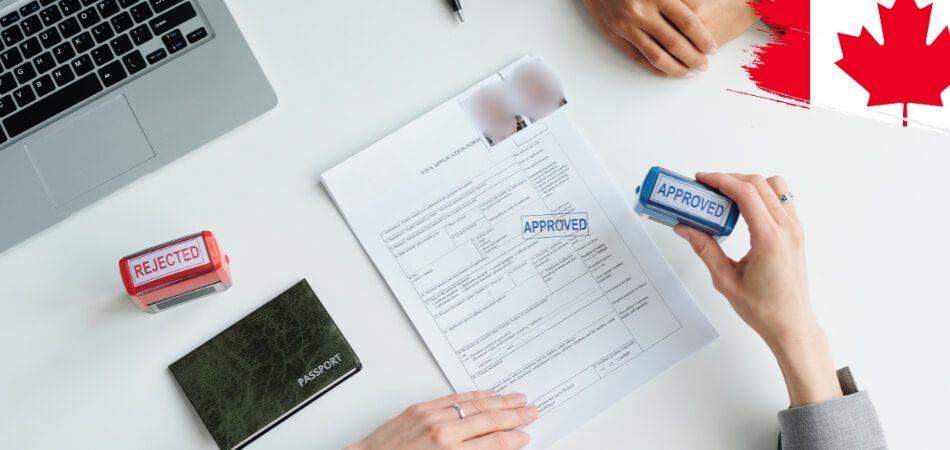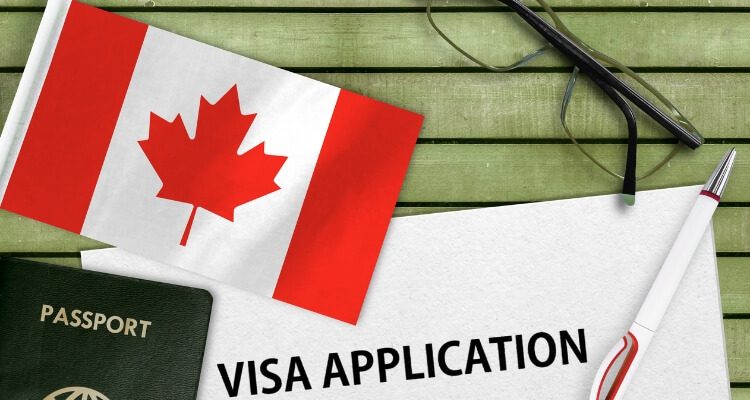Participating in a business conference in Canada can be a key moment for professionals seeking to expand their networks and gain insights into global market trends. However, the journey to such an event often begins with obtaining a conference visa.
But what happens when you encounter unexpected obstacles? This is why many wonder, “Can conference visa be rejected after approval for Canada”
Yes, a conference visa may be rejected after approval for Canada if new information is provided or if compliance with visa conditions is compromised before entry into the country. Always ensure all conditions are met to avoid issues.
There is no way to overstate the importance of meeting all requirements. Using the instructions in this article, you will be able to maintain your visa status, which will allow you to enter the country without delay.
Canadian Conference Visa Approval Process – Things You Must Know
Knowing the Canadian conference visa approval process is essential for a smooth application. You must gather all of your documents, including a valid passport, before applying for a visa. Additionally, you should prepare evidence that you are registered for the conference, as well as financial support for the trip.
During the application process, you will need to complete the forms accurately. Be sure to double-check the details, as mistakes may cause delays. If you’re attending an upcoming conference in Canada, apply well in advance to avoid last-minute issues.
After submission, the waiting period for approval may vary. It’s important to stay updated on the status of your application. Once approved, you’ll be set to enjoy your conference experience without worry.
Can Conference Visa Be Rejected After Approval for Canada?
Yes, a conference visa can be rejected after approval in Canada. This may occur if new information arises or visa conditions are not met. So, it’s essential to know the reasons that could lead to such a decision. The following are some reasons why a conference visa can be rejected after approval:
New Information
If authorities discover new information, your visa may be reconsidered. This could include changes in your background or criminal history. New facts can lead to concerns about your eligibility. Keep your application accurate and complete at all times.
Compliance Issues
Before entering Canada, visa applicants must meet specific conditions. If you fail to comply with these requirements, your visa could be canceled. For example, failing to provide the necessary documentation might trigger a review. So, maintaining compliance is crucial for smooth entry.
Changes in Personal Circumstances
Your visa may be affected by life changes, such as a job loss or legal issues. Such changes may raise concerns for authorities about your stay. It’s essential to inform them of any significant developments. This transparency helps maintain trust in the application process.
Criminal History
Any new criminal charges can trigger a visa review. Authorities take criminal records seriously, especially those involving serious offenses. Even minor infractions can lead to complications. It’s essential to maintain a clean record while traveling.
Failure to Attend the Conference
Your visa may be at risk if you do not attend the registered conference. Authorities expect you to fulfill the purpose of your visit. Missing the event raises questions about your intentions. Always ensure that your travel plans align with your visa application.
Misrepresentation of Intentions
Misrepresenting your travel reasons can result in rejection. Authorities review your application for authenticity. Any inconsistency in your story can create doubts. It is always best to be open and truthful in your application.
Incomplete Documentation
Submitting incomplete or incorrect documentation can cause issues. Missing paperwork might result in automatic rejection. It is crucial to double-check all requirements before submission. Proper documentation supports your case and ensures smooth processing.
Knowing these reasons is the key to a successful application. Always be aware of your obligations and responsibilities. If faced with challenges, Consider responding to Canadian conference visa refusal carefully for a better chance of success.
How Can You Ensure Your Conference Visa Remains Valid?
Attending conferences abroad can be an enriching experience, but it’s crucial to ensure your visa remains valid throughout your stay. Here’s a step-by-step guide to help you maintain the validity of your conference visa:
Step 1: Know Your Visa Conditions
Familiarize yourself of with the terms and conditions of your conference visa, including its duration and any restrictions on activities you can engage in while in the host country. Knowledge of these parameters will help you avoid unintentionally violating your visa terms.
Step 2: Monitor Expiry Dates
Regularly check the expiry date of your conference visa to ensure you do not overstay your permitted duration in the host country. Set reminders well in advance to avoid any last-minute complications or penalties.
Step 3: Keep Updated on Regulations
Stay informed about any changes or updates to immigration regulations in the host country that may affect your visa status. This could include changes in entry requirements, visa extension procedures, or travel restrictions.
Step 4: Maintain Required Documents
Keep all necessary documents related to your conference visa, such as invitation letters, conference registration confirmations, and proof of accommodation, organized and easily accessible. Having these documents readily available can facilitate any interactions with immigration authorities.
Step 5: Adhere to Visa Conditions
Respect the conditions of your conference visa, including restrictions on employment, study, or other activities not related to the purpose of your visit. Engaging in unauthorized activities could lead to visa cancellation or other legal consequences.
Step 6: Plan Travel Accordingly
Schedule your travel arrangements in a way that aligns with the duration of your conference visa. Avoid making plans that extend beyond the validity period of your visa to prevent any complications during your stay.
Step 7: Seek Professional Advice if Needed
If you have any doubts or concerns about your conference visa status, consider seeking advice from immigration experts or legal professionals familiar with the immigration laws of the host country. They can provide guidance relevant to your specific situation.
Step 8: Report Changes if Necessary
Inform the relevant authorities immediately if any changes to your circumstances may affect your visa status, such as changes in your travel itinerary or accommodations. Transparency is essential to maintaining the integrity of your visa.
Best Ways to Avoid Compliance Problems
Compliance issues can feel like a challenge, but with the right approach, you can avoid common mistakes. By implementing proactive strategies and developing a culture of compliance, organizations can significantly reduce their risk of facing issues down the line. Here are some effective ways to steer clear of compliance problems:
- Keep yourself informed about the latest compliance regulations relevant to your industry. Regularly check for updates from reputable sources or consult with compliance professionals to ensure you’re always in the know.
- Make sure to maintain detailed records of all your compliance-related activities. This includes policies, procedures, training materials, and any communication regarding compliance matters. Documentation serves as your safety net in case of audits or investigations.
- Educate your team about compliance requirements and best practices through regular training sessions. Ensure everyone understands their roles and responsibilities in maintaining compliance standards within the organization.
- Perform periodic audits of your compliance processes to identify any potential gaps or areas for improvement. This proactive approach allows you to address issues before they escalate into significant compliance breaches.
- Promote open communication channels within your organization, allowing employees to raise compliance concerns or report potential violations without fear of retaliation. Encourage transparency and accountability at all levels.
- Don’t hesitate to seek guidance from compliance experts or legal professionals when facing complex compliance issues. Their expertise can provide valuable insights and help you guide tricky situations effectively.
- In the event of a compliance breach, act swiftly to investigate the issue, mitigate damages, and implement corrective measures. The immediate response demonstrates your commitment to upholding compliance standards.
- Regularly review your compliance processes and procedures to ensure they remain effective and aligned with evolving regulations. Be willing to adapt and make necessary changes to stay ahead of compliance challenges.
What to Do if Your Conference Visa Is Canceled?
When a conference visa is canceled, it can be a stressful and disheartening experience. Understanding the steps to take in this situation can help alleviate some of the anxiety and enable you to respond effectively. Here’s what you can do:
Stay Calm and Assess
Take a deep breath and assess the situation calmly. Understand the reason behind the visa cancellation and gather all relevant documents and information related to your visa application. This preparation will help you effectively address the issue and take appropriate action moving forward.
Contact the Issuing Authority
Reach out to the embassy, consulate, or immigration authority that issued your visa. Inquire specifically about the reason for the cancellation, as understanding this will help you determine the best course of action. Additionally, seek clarification on any steps you can take to resolve the issue.
Seek Legal Advice
Consider consulting with an immigration lawyer or legal expert specializing in visa matters. You can receive guidance from them regarding your rights, options for appeal, and steps after a Canadian conference visa is rejected twice.
Explore Alternative Options
Investigate alternative visa options that may be available to you, such as applying for a different type of visa or exploring visa waiver programs if applicable. Be proactive in exploring all possible avenues to salvage your travel plans.
Request for Reconsideration
If you believe there has been a misunderstanding or error leading to the visa cancellation, submit a formal request for reconsideration to the issuing authority. Provide any additional documentation or evidence that supports your case.
Consider Rescheduling
If your conference dates allow flexibility, consider rescheduling your travel plans to a later date. This may give you additional time to resolve the visa issues and secure a new visa if necessary. Additionally, staying in close communication with the conference organizers can help you stay updated on any changes and ensure your participation is still possible.
Stay Informed
Stay updated on any changes or developments related to your visa status. Regularly check for updates from the issuing authority and maintain open communication with relevant stakeholders. Being proactive in seeking information can help you anticipate potential issues and respond swiftly if any arise.
Have a Backup Plan
Prepare a backup plan in case you are unable to resolve the visa issues in time for your planned travel dates. This could include exploring virtual attendance options for the conference or postponing your participation until the visa situation is resolved.
How to Apply for a Canadian Visa Properly?
Applying for a Canadian visa requires careful attention to detail and adherence to specific procedures. Here’s a step-by-step guide to help you guide the process smoothly:
Step 1: Determine the Type of Visa
Identify the type of Canadian visa that best suits your purpose, whether it’s a tourist visa, study permit, work permit, or permanent residency. Each visa category has its own set of requirements and application procedures.
Step 2: Gather Required Documents
Compile all necessary documents, including your passport, application forms, photographs, proof of funds, and any supporting documents required for your specific visa category. Ensure that your documents meet the specified criteria to avoid delays or rejection.
Step 3: Complete the Application Form
Fill out the appropriate application form accurately and completely. Double-check all information provided to avoid errors or discrepancies that could impact the processing of your visa application.
Step 4: Pay the Application Fee
Pay the required visa application fee through the designated payment method accepted by the Canadian immigration authorities. Keep a copy of the payment receipt as proof of payment.
Step 5: Submit Your Application
Submit your visa application either online through the Immigration, Refugees, and Citizenship Canada (IRCC) website or a Visa Application Center (VAC) if applicable. Follow the instructions provided for submission and ensure that your application is submitted within the specified timeframe.
Step 6: Attend Biometrics Appointment
If required, schedule and attend a biometrics appointment at a designated location. During the appointment, provide your fingerprints and a photograph as part of the biometric data collection process.
Step 7: Wait for Processing
Allow sufficient time for the processing of your visa application. Processing times vary depending on the type of visa and other factors such as the volume of applications received.
Step 8: Provide Additional Information if Requested
Be prepared to provide additional information or attend an interview if requested by the Canadian immigration authorities. Cooperate fully and promptly respond to any requests to facilitate the processing of your application.
FAQs for Can Conference Visa Be Rejected After Approval for Canada
Securing approval for a conference visa to Canada is a significant step, but applicants often have concerns about potential rejection even after approval. Below are some frequently asked questions along with their answers:
What Should I Do if My Visa Is Revoked?
If your visa is revoked, consult with immigration experts or legal professionals to understand your options and determine the best course of action. They can guide appealing the decision or reapplying for a visa.
Can I Travel to Canada While My Visa Revocation Is Under Review?
It’s generally advisable to avoid traveling to Canada while your visa revocation is under review, as it may complicate your situation further. Wait until the matter is resolved before planning your travel.
Will a Visa Revocation Affect Future Visa Applications?
A visa revocation may affect future visa applications, as it could raise questions about your credibility and eligibility. Be prepared to address any concerns raised by immigration authorities in subsequent applications.
Can I Seek Legal Assistance for Visa Revocation Issues?
Yes, seeking legal assistance can be beneficial in navigating visa revocation issues. Immigration lawyers can provide expert advice and representation to help resolve your case effectively. They can also guide you through the appeals process, ensuring that you understand your rights and options.
What Documentation Should I Provide if Appealing a Visa Revocation?
When appealing a visa revocation, provide any relevant documentation that supports your case, addresses concerns raised by immigration authorities, and demonstrates your eligibility for the visa.
How Can I Prevent Visa Revocation After Approval?
To prevent visa revocation, ensure all information provided in your application is accurate and up-to-date. Stay informed about changes in circumstances that may affect your visa eligibility and quickly inform immigration authorities of any relevant changes.
Bottom Line
Visa applications and maintaining visa status require attention to detail and proactive measures. The process of obtaining a conference visa to Canada is a significant milestone, but it’s important to remain vigilant throughout.
Various factors, like changes in circumstances or compliance violations, can cause unexpected obstacles, such as visa revocation. The importance of staying informed, sticking to visa conditions, and seeking appropriate assistance when necessary cannot be overstated
Keeping constant vigilance and observing visa regulations is essential when asking, “Can Conference Visas Be Rejected After Approval for Canada?” If you follow these steps and address any challenges promptly, you will be more likely to have a successful and hassle-free conference in Canada.








